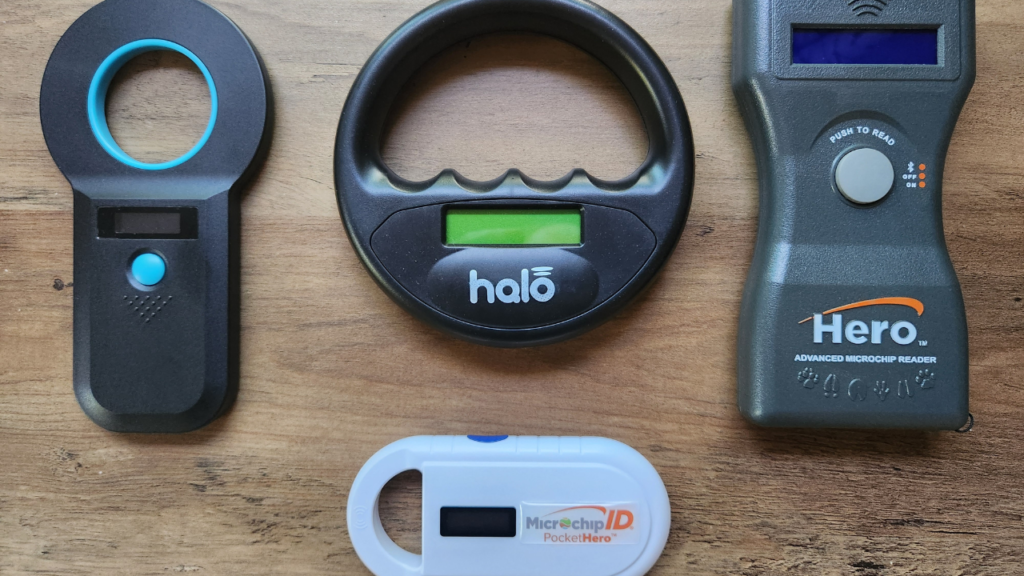
Microchips save lives and keep your pets safe. Key to their effectiveness is understanding how they do and don’t work. From the sublime to the absurd, here are some of the most common myths about pet microchips.
Myth #1
Microchips have GPS
This is probably the most common myth talked about today. With GPS a part of our daily lives in mobile phones and other devices, it doesn’t seem like a stretch that it would be part of the pet microchip. Unfortunately, it isn’t, and here’s why.

GPS devices need a power source
GPS collars for dogs are popular and their technology has improved to include a battery life of up to 30 days. Even so, they must be plugged into an electrical outlet to be fully charged. The latest gen units like Fi are streamlined, but are still much bigger and heavier than a tiny microchip.

Microchips are passive transponders
This means that they are like an antenna that only gives off a signal when in the proximity of the scanner. For this reason they will last for the lifetime of the animal, but they are incapable of connecting with GPS satellites.
Myth #2
Microchips are automatically registered
Many owners don’t know if their pet’s microchip is registered or if they are even microchipped! This is why I focus so much on this topic. There are a few ways that one’s dog or cat comes to be microchipped, and each way can lead to a different misunderstanding.
You adopted your pet from a shelter or rescue
Because shelters, rescues, and humane societies are very aware of the lost pet problem, the majority of these animals will be microchipped at the time of adoption.

Some of these organizations do register the chip to the adopter through their software system, so this is not entirely a myth. However, not all of them do register, and the staff member completing the adoption could make a mistake. One typo on the microchip number or the phone number can render the registration useless.
You purchased your dog from a breeder

Many breeders microchip because it helps them keep better records. At the time of sale they will write the number on the paperwork and advise you to complete registration when you get home. They will not register for you. I recently microchipped a Golden Retriever puppy who was purchased from a breeder. While it is unusual for such a puppy to not be microchipped, it is not unheard of. I guess some breeders don’t find it important or figure it’s the buyer’s responsibility.
You had your pet microchipped at a vet or clinic
Veterinarians are the primary implanters of microchips. Many people believe that they do not need to register a microchip because their veterinarian maintains records. I’m here to tell you that is not how it works. Unless they have a contract with local animal control, veterinary staff do not want to get involved in reuniting lost pets or in ownership disputes. It’s not because they don’t care, it’s because they don’t have the time or resources. For this reason, many vets do not keep records of microchip numbers. They tell the owner it’s their responsibility to register. Even if they do enter the number in the pet’s record, it is not a searchable database like a microchip registry.
Myth #3
Scan a microchip with your mobile phone
This would be great, but it unfortunately isn’t feasible with today’s technology. Unlike a QR code which can be read with the camera on your phone, a microchip emits a frequency that requires special hardware to detect. As discussed in Which pet microchip scanner is the best? the smaller scanners can only read one kind of chip. In order to read the three kinds in circulation today, more hardware is required which results in a bigger, heavier scanner.

I have seen some articles and videos on scanning for a pet microchip with a mobile phone or even with a stud finder! Neither of these devices will detect or read a microchip. The only device capable of performing that function is a microchip scanner. While the best ones cost hundreds of dollars, you can purchase a decent one on Amazon for around $50. Just be aware that it will only read 15 digit chips.
Myth #4
Microchips cause cancer
Pets live longer lives today thanks to improvements in medical care. Vaccinations, parasite control, antibiotics, and other common treatments can keep our beloved animals going well into their teens. Sadly, they won’t live forever, and many in old age will die of organ failure or cancer.
Losing our pets can be devastating and so we look for something to blame
I have heard arguments that diet, vaccines, household cleaners, and any number of other things including microchips can cause illness and death in pets. In reality, a cat or dog in their teens is simply reaching the end of their lifespan and will succumb to one thing or another. Terminal illness in younger animals is often genetic, or just a tragic roll of the dice.

Lab rats and mice
Those who believe in this myth point to the prevalence of cancer in laboratory rats and mice in the area where they are microchipped. If you have had the pleasure of keeping rats and mice as pets you will know that, if they live long enough, they will get cancer. They have sadly short lives, rarely more than three years, and are prone to developing tumors. This is why they are used in cancer research.
Myth #5
The government can track you with a microchip
This is a conspiracy theory that has been around for a while but became very popular during the time of Covid. Word went around that microchips were being implanted in people along with the Covid vaccine. While this might seem feasible to someone who has never seen a microchip, it only serves to give a good laugh to those of us who have.
Microchips are the size of a grain of rice
Although relatively small, microchips are much too big to pass through the tiny needle used for a vaccine or any other liquid. Have you ever donated blood? It’s more like that needle. Not something a nurse could sneak up without you noticing!
Microchips don’t have GPS
See Myth #1. Microchips don’t and can’t have GPS, so they have no tracking ability. The only information contained in a chip is a number — actually, a barcode that translates to a number — that means nothing if not registered. The most absurd part of this is the fact that everyone voluntarily carries a tracking device with them at all times … their mobile phone. New cars also have GPS which is cool if you don’t remember where you parked or if the car is stolen, but I suppose is a problem if you believe the government is tracking your whereabouts.

